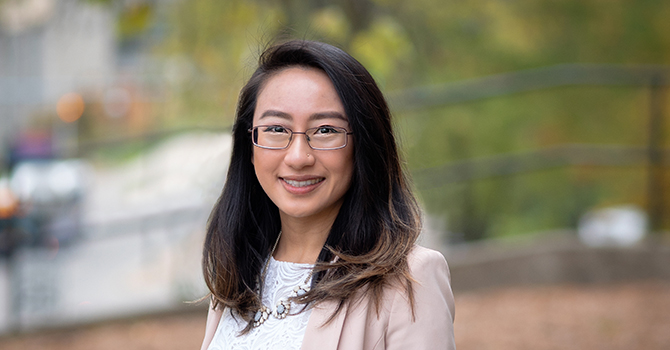Accessible Policies: Quality Health Care for the Most Underserved

Tran T. Doan
PhD Student in Health Services Organization and Policy
As a first-generation college graduate, navigating a doctoral program and developing my own research questions can be challenging. Although I have an American accent, English is my second language, so I'm constantly working to improve my writing and oral presentation skills. I was born to Vietnamese parents in California and raised in Pittsburgh, Pennsylvania. I have witnessed firsthand the myriad challenges faced by refugee immigrants as they navigate a new country—many doing so without education, language, or professional skills.
The majority of Vietnamese immigrants came to the US and other Western countries in the years after the war ended in 1975. But Vietnamese-Americans—like many other immigrant groups and minorities—still face significant barriers to health and health care access in the US.
Vietnamese-Americans still face significant barriers to health and health care access in the US.
As a public health professional, I want to implement policies that make a wide range of quality health services accessible for under-resourced communities—particularly for immigrant Americans and people with life-limiting but preventable illnesses like HIV/AIDS and opioid addiction. My current research is around early prevention of childhood dental cavities, the top chronic condition of children worldwide.
Tooth decay is an unevenly distributed problem, with the highest rates among racial and ethnic groups, immigrant groups, and those from low socioeconomic groups. What many might experience as an inconvenience others experience as a considerable burden on costs and quality of life.
This work is part of a larger project supported by the National Institutes of Health and led by principal investigator Dr. Margherita Fontana, a professor in the School of Dentistry. Under the direction of Dr. Lisa Prosser, my role is to create simulation models that establish long-term economic and health outcomes for early treatment of children at risk for dental cavities. We hope these models will demonstrate effectively the need for funding to support early interventions that help keep children healthy for the rest of their lives.
I chose Michigan Public Health because the Health Management and Policy department is well resourced—with broad teaching and research opportunities, renown faculty mentors, and expertise across many interdisciplinary research centers.
Without quality data on minority populations, it is difficult to perform sophisticated data analysis and simulation modeling.
I was fortunate to be selected as a Health Policy Research Scholar with the Robert Wood Johnson Foundation. At the 2018 summer institute in Washington, DC, my cohort participated in a health policy pitch competition, which involved training workshops on framing and messaging, data visualization, and visits to policy makers on Capitol Hill.
My cohort is in our third year of HPRS training, focusing now on leadership development. We are each assigned a professional coach to help us identify and develop our leadership style. My coach is a licensed clinical social worker with decades of experience in public health. She is helping me refine skills in facilitating difficult conversations and building strong relationships.
The Asian American community is the fastest growing racial group in the US, and yet it is one of the most understudied groups in the country. Finding disaggregated data on Asian Americans–Vietnamese, Chinese, Filipino, and many more–that treats us as multiple race categories is challenging. Without quality data on minority populations, it is difficult to perform sophisticated data analysis and simulation modeling.
Asian Americans are often typecast as a "model minority," which overlooks our complexity and diversity and obscures funding opportunities to support this community.
Asian Americans are often typecast as a "model minority," which overlooks our complexity and diversity and obscures funding opportunities to support this community. In addition to my own family's situation and other identities creating, my experiences as someone of Vietnamese descent are much different than those of someone from India or China or Indonesia. I didn't receive mentorship or minority-based scholarships when I was younger because I think people consider me as not deserving or needing help, despite growing up poor and underrepresented.
I can see myself becoming a policy maker. In addition to considering career paths related to research, I am interested in running for a local elected position. This would bring together, hopefully in effective ways, my academic training with my passion for supporting populations that face barriers to health and health care access.
